The 63rd annual celebrations of Sree Thyagabrahma Sangeetha Sabha in Thrissur featured three captivating concerts, including two duets and one solo performance.
The festivities commenced with a vibrant vocal concert by the Bangalore Brothers, M. B. Hariharan and S. Ashok. A notable aspect of the two-and-a-half-hour concert was the musicians’ selection of compositions from major vaggeyakaras. The performance began auspiciously with the rendition of the Todi ata tala varnam, ‘Kanakangi ni chelima kori,’ a composition by Ponniah Pillai. The duo delivered it with great enthusiasm, both in unison and individually. Hariharan’s crisp Alap for Yadukulakamboji was commendable, followed by Dikshitar’s ‘Abhayambhika yey’ in rupakam. Ashok’s Virutham marked the commencement of ‘Dayamado ranga’ by Purandaradasa in Kalyani, a fast-paced invocation to Lord Krishna.
The duet presented the Dhanyasi composition ‘Meenalochana bro’ by Syamasastri in misrachap. The Kuntalavarali composition ‘Mookambike’ served as a prelude to the main raga of the evening, Bilahari. Hariharan’s extended Alap, marked by aesthetically crafted phrases, identified the raga from the outset. Trivandrum Sampath’s violin further enhanced the beauty of Bilahari, with remarkable dynamics. The Niraval at ‘Gowdathurangam’ and the accompanying swaras were endearing. The composition chosen for the main segment was the famous ‘Smara sada manasa Balagopala’ in adi. The resonant tone of Balakrishna Kammath’s mridangam and the staccato beatings on the ghatam by Vellattanjur Srijith were remarkable.
Following Tanam, the pallavi ‘Garugamana’ featured ragas Hamsadwani, Shanmughapriya, Ranjini, Lalita, and Sree. The duo surprised the audience by including two Malayalam compositions. The first was ‘Karuna kadalil neethidum,’ composed by the late connoisseur K. P. B. Nambiar, with music scored by the veteran violinist M. Chandrasekharan in Sindhubhairavi. The composition, praising Sabarimala Sastha, was relevant to the current season. The concert concluded with ‘Hreem mantra kanike’ by Kavalam Narayana Panicker in Kuntalavarali.
Melodic violin duet
The second day became memorable with a violin duet by Lalitha-Nandini sisters, who made a long-awaited return to the city. Both musicians and the audience expressed excitement, appreciating the rapport established from the beginning. Notably, the duo explained each composition, benefiting the lay connoisseurs.
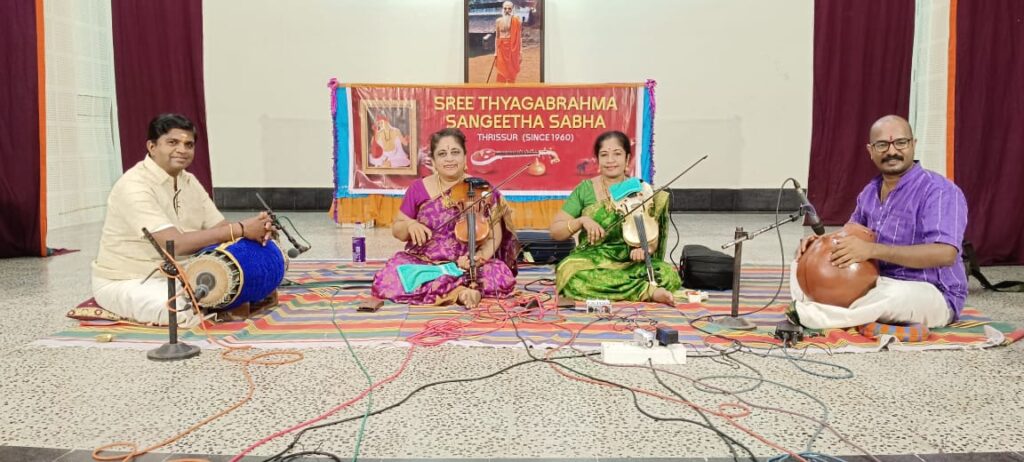
The opening varnam, ‘Evaribodhana’ by Patnam Subramanya Iyer in abhogi was stimulating. Swaras, played individually and combined, were abundant in Dikshitar’s Natta composition ‘Mahaganapatim’ in adi. The duet ‘Bhajanaseya’ of Annai Iyya in Kedaram followed, with perfect Sruti alignment between the two violins, creating the illusion of a single violin. The musicians demonstrated propriety by playing the 63rd mela raga Latangi in celebration of the 63rd anniversary of the Sabha. Lalitha elaborated on the raga, followed by Nandini on the lower strings, enhancing the beauty of the raga. ‘Kripa jesina’ was chosen for Niraval, adorned with captivating swaras. The kriti was ‘Aparadhamulan’ in adi.
Braving the distraction of the noise from heavy rains and wind, the duo chose to play ‘Hiranmayem’ in
Lalita with élan, the composition of Dikshitar in rupakam. Interestingly, Lalitha described the legendary
story related to the composition. How the composer chose to do this composition when his wife out of
abject penury requested him a number that would make them rich. After listening to the kriti, she had a
dream in which Goddess Lakshmi appeared in all her splendour and she was convinced about her
husband’s view that one should not be asking for wealth through one’s composition.
The much-anticipated ‘Sarojadalanetri’ in Sankarabharanam, one of the Navaratnamalika compositions of Syamasastri, served as the main piece. Nandini’s alapana showcased the bewitching beauty of the sampoorna raga. ‘Samagana’ was adorned with a wide spectrum of swaras. The percussion tani between Ramesh Babu (mridangam) and Aluva Rajesh (ghatam) was enjoyable, with Ramesh’s pakkam and Rajesh’s beatings proving noteworthy. The concert concluded with Swati’s ‘Chaliye kunjan’ in Brindavana sarangi and the Thirupugazhu of Arunagirinathar ‘Oru pozhudum’ in Chandana tala, rendered in two tempos.
Soulful creativity
The third day featured a delightful vocal concert by Bhargavi Venkatram. The two-and-a-half-hour performance showcased select compositions in her sweet voice, revealing a notable urge for creativity throughout. She opened with ‘Mathe Malayadwaja,’ the popular Kamas Varnam of Muthayya Bhagavathar in adi. The rendition was effortless, with unplugged swaras gliding across octaves. She then transitioned to ‘Sraseeruha,’ Puliyannoor Doraiswamy Iyer’s composition in Natta and adi. The sloka ‘Vandemataram’ preceded the Subbaraya Sastri composition in Reetigowla and mishrachap, rendered in a slow tempo, emphasizing her proficiency in melody.
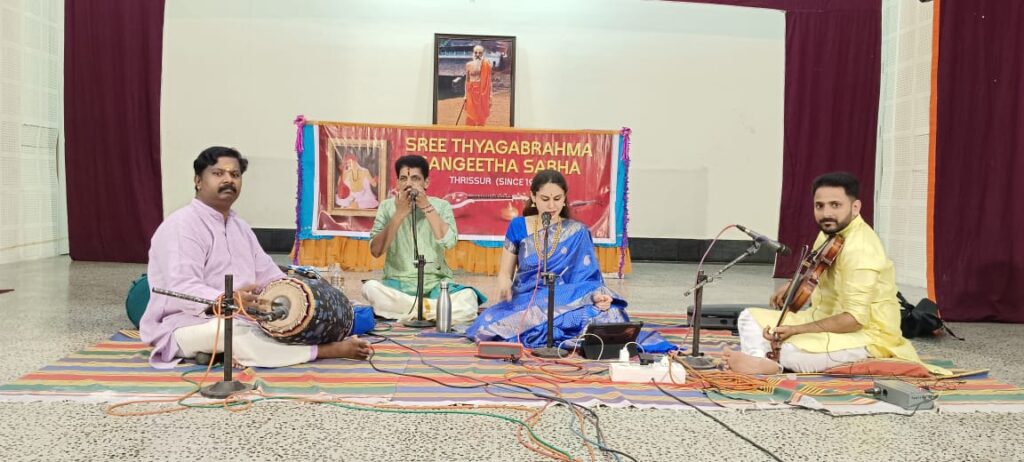
Beauty arising out of contrast in the repertoire was evident in choosing ‘Bogeedra sayanam’ of Swati in Kuntalavarali and khanta chap in fast tempo, next. She seemed to enjoy the number with its jumping rhythm.
The prolonged essaying of Varali brought out all its shades, and ‘Mamava Meenakshi’ of Dikshitar was the chosen piece, with an ornate and laudable niraval at ‘Shyama Shankari.’ Despite feeling like the main raga, it turned out to be the sub-main. After ‘Innu daya barade’ of Purandaradasa in Kalyanavasantham and khanta chap, she elaborated on Saveri. Violin by Uduppi Sreejith was admirably proportionate, accompanying the composition ‘Sri Kamakoti Pitasthite’ of Mysore Sadasiva Rao. The percussion tani, featuring Palakkad Maheshkumar (mridangam) and Payyannur Govinda Prasad (morsing), affirmed that the number marked the main raga of the evening. Compositions in Kanada, Behag, and Bowli were rendered before concluding the concert.

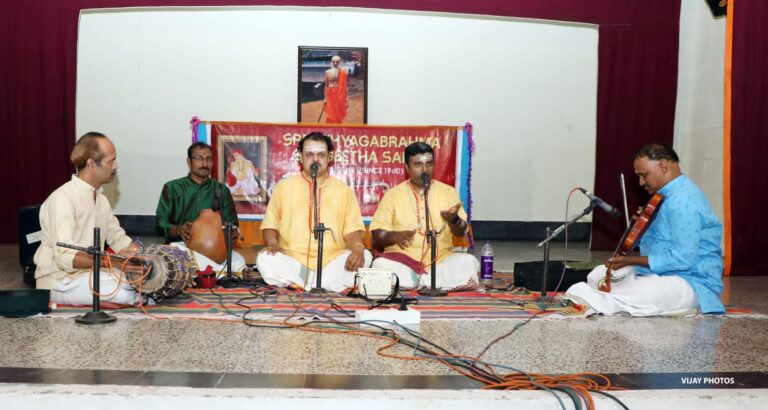
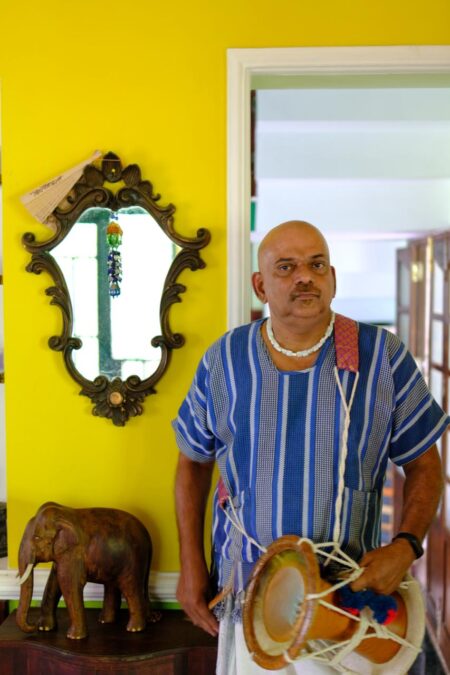
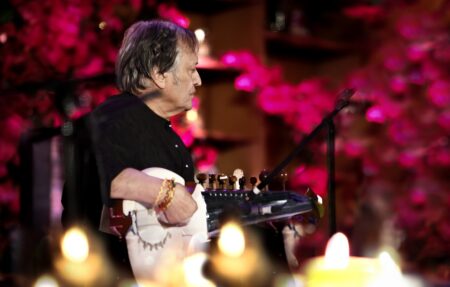
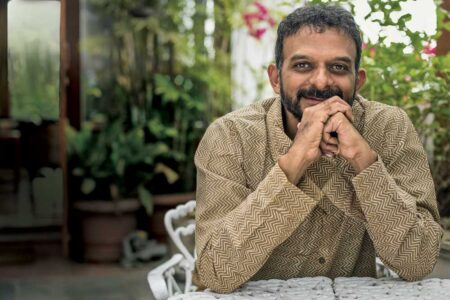
1 Comment
Delighted to note the focus on soulful singing